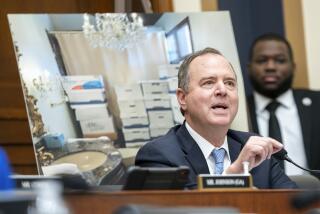Democrats target Republican ties to Koch brothers
WASHINGTON — Democrats struggling to combat a flood of outside money pouring in to defeat their candidates have found at least a temporary solution: If you can’t beat them, brand them.
The latest strategy of Democratic messaging is tying Republican candidates and policies to the party’s most prominent — and at times vilified — financial patrons, billionaire industrialists Charles and David Koch.
Senate Majority Leader Harry Reid (D-Nev.) initiated the strategy last month when he decried the brothers — whose last name is pronounced “coke” — from the Senate floor as “shadowy billionaires” and “un-American.”
This week, after Rep. Paul D. Ryan (R-Wis.) released his new austere budget, Reid described it as a blueprint for a “modern Kochtopia.”
And when the Supreme Court on Wednesday struck down overall limits on how much wealthy donors can spend per congressional election, Reid said it was no surprise, “because as you know the Koch brothers are trying to buy America.”
It’s a campaign strategy that serves several purposes for Democrats, and strategists say the effort is already paying off in grass-roots fundraising and by helping the party crystallize a message against the GOP.
On Thursday, Koch Industries Chief Executive Charles Koch felt compelled to respond and, in a Wall Street Journal op-ed piece, likened the Democratic campaign to “character assassination.”
And Republicans dismissed the effort as a sign of Democratic desperation, predicting it would not prevent a GOP takeover of the Senate after the midterm election this fall. They point to a recent George Washington University Battleground poll that found Reid actually had lower favorability ratings than the Kochs and that only 48% of voters had even heard of the brothers.
“It’s about the biggest example of distraction politics that I’ve ever seen,” said Levi Russell, a spokesman for the Koch-funded political advocacy group Americans for Prosperity. “Folks care a lot more about how Obamacare is impacting their daily lives than what some senator says on the Senate floor.”
But following Reid’s lead, other Democrats are now rallying behind his mantra that the GOP is “addicted to Koch.”
In Alaska, Sen. Mark Begich, one of the most vulnerable Democrats up for reelection this year, is airing a television ad featuring Alaskans talking about how Koch Industries closed a refinery in their state, while a message on the screen reads: “Koch brothers go home.”
Minnesota Sen. Al Franken sent his supporters in a fundraising email titled “Is Kochtopus really a word?” It read: “I suppose ‘Kochtopus’ is as good a name as any for the huge, secretive network of interest groups the Koch brothers masterminded to funnel dark money all over the country.”
So ingrained has the Democratic messaging become that even Republicans are joining in the game. Former presidential hopeful Herman Cain joked after Wednesday’s Supreme Court ruling that liberal Democrats would condemn the decision as a “Kochpocalypse.”
The Koch campaign mirrors a strategy employed by Priorities USA, a pro-Obama “super PAC” that used ads early in the 2012 election to cast Mitt Romney as an unfeeling businessman because of the practices of Bain Capital, the Boston investment firm he founded.
Republicans did the same thing in 2010 when they focused their campaign to retake the House of Representatives by portraying then-House Speaker Nancy Pelosi as a free-spending San Francisco liberal.
With no elected Republican holding the same notoriety as Pelosi, the Kochs — ranked No. 6 and No. 7 on the Forbes list of the world’s billionaires — offer a convenient target, particularly because of their prolific spending on races across the U.S.
“They are becoming a brand,” said Democratic Congressional Campaign Committee Chairman Steve Israel of New York. Democrats concede that focusing on the Koch brothers is an effective way to mobilize their base — an acute concern in midterm elections. Democratic turnout in 2010 was unusually low and the party wants to avoid a repeat.
Also, with many Democratic incumbents still waiting on primary elections to determine which Republican they’ll face in the fall, they are finding the Kochs are a useful stand-in.
Democratic strategists brush aside polls that show many Americans are unfamiliar with the brothers.
“My GOP friends say no one knows who the Koch brothers are,” said Paul Begala, a longtime Democratic strategist. “True, but fewer people knew what Bain Capital was until we told them. This is classic asymmetrical warfare. When you can’t match them bullet-for-bullet, diminish the effectiveness of the other side’s weaponry.”
In recent years, the Koch brothers — who control the nation’s second-largest privately held company — have aggressively sought a more influential role in American politics, though they have preferred to keep much of their activity secret through a network of political groups. They were early backers of the small-government tea party movement in the GOP and have supported many tea party candidates.
Koch Industries has given nearly $2.4 million to candidates and other campaign committees this year, according to the Center for Responsive Politics.
Americans for Prosperity, the 501(c)(4) group tied to the Kochs, has spent well over $30 million in this cycle, more than any category of outside groups, including super PACs.
An analysis of television advertising released last week by Kantar Media Intelligence for the Cook Political Report found that Americans for Prosperity had run more than three times as many ads in the battleground Senate races than the Senate Democrats’ own super PAC.
In 2012, political groups supported by the brothers, including Americans for Prosperity, spent more than $60 million to defeat Obama, according to the center.
After weeks of unwanted attention from Reid, Charles Koch fired back in his Wall Street Journal piece, criticizing “collectivists” who “strive to discredit and intimidate opponents.” He also defended his firm as one that employs 60,000 Americans, primarily in the energy sector, and said he would keep fighting for his vision of limited government.
Reid, at a rally of union activists Thursday, couldn’t help but celebrate Koch’s editorial as a sign that his strategy is working. Reid mused that he must have gotten under their skin:
“I’ve helped make them a little more infamous or famous, and I’m glad I’ve done that.”
Times staff writer Daniel Rothberg in Washington contributed to this report.
More to Read
Start your day right
Sign up for Essential California for news, features and recommendations from the L.A. Times and beyond in your inbox six days a week.
You may occasionally receive promotional content from the Los Angeles Times.







